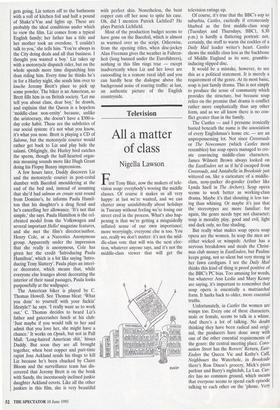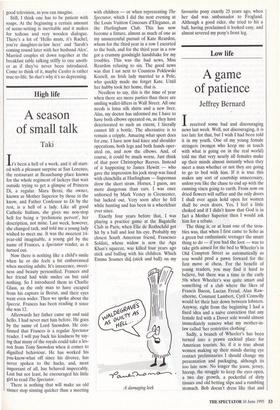Television
All a matter of class
Nigella Lawson
First Tony Blair, now the makers of tele- vision soap: everybody's wooing the middle classes. Of course it makes us all very happy: at last we're wanted, and we can chatter away uninhibitedly about holidays in Tuscany without feeling we're losing our street cred in the process. What's also hap- pening is that we're getting a misguidedly inflated sense of our own importance; more worryingly, everyone else is too. You see, really we don't matter: it's not the mid- dle-class vote that will win the next elec- tion, whatever anyone says, and it's not the middle-class viewer that will get the television ratings up.
Of course, it's true that the BBC's sop to suburbia, Castles, excitedly if erroneously blurbed as the first middle-class soap (Tuesdays and Thursdays, BBC1, 8.30 p.m.) is hardly a flattering portrait: not, certainly, the stuff to warm the cockles of a Daily Mail leader writer's heart. Castles shows the middle class less as the backbone of Middle England as its sore, grumble- inducing slipped disc.
It would be a mistake, however, to see this as a political statement. It is merely a requirement of the genre. At its most basic, soap is just family drama. This is not simply to produce the sense of community which provides the structure, but because soap relies on the premise that drama is conflict rather more emphatically than any other form, and as we all know there is no con- flict greater than in the family.
The Castles — and I presume ironically buried beneath the name is the association of every Englishman's home etc. — are an unprepossessing lot. Not since Crossroads or The Newcomers (which Castles most resembles) has soap opera managed to cre- ate convincing middle-class characters. James Wilmott Brown always looked on the EastEnders set as if he'd escaped from Crossroads, and Annabelle in Brookside just wittered on, like a caricature of a middle- class, nosy-parker do-gooder (rather like Lynda Snell in The Archers). Soap opera seems to work better as working-class drama. Maybe it's that shouting is less tax- ing than whining. Or maybe it's just that the stereotypes are more familiar: for again, the genre needs type not character; soap is morality play, good and evil, light and dark only, no fine shading.
But really what makes soap opera soap opera are the women. In soap the men are either wicked or wimpish: Arthur has a nervous breakdown and steals the Christ- mas club money in EastEnders, but Pauline keeps going, not so silent but very strong in her fawn cardigans. I see the Daily Mail thinks this kind of thing is proof positive of the BBC's PC bias. Too amusing for words, but whatever Ann Leslie and Mary Kenny are saying, it's important to remember that soap opera is essentially a matriarchal form. It harks back to older, more essential truths.
Unfortunately, in Castles the women are wimps too. Every one of these characters, male or female, seems to talk in a whine. And there's a lot of talking. No doubt thinking they have been radical and origi- nal, the producers have done away with one of the other essential requirements of the genre: the central meeting place. Coro- nation Street has the Rovers' Return, East- Enders the Queen Vic and Kathy's Caft Neighbours the Waterhole, in Brookside there's Ron Dixon's grocery, Mick's pizza parlour and Barry's nightclub, La Luz. Cas- tles has no common ground, which means that everyone seems to spend each episode talking to each other on the 'phone. Very good television, as you can imagine.
Still, I think one has to be patient with soaps. At the beginning a certain amount of scene-setting is inevitable and it makes for tedious and very wooden dialogue. There's a lot of 'Hello mum, it's Rachel, you're daughter-in-law here' and 'Sarah's coming round later with her husband Alex'. Married couples sit down together at the breakfast table talking stiffly to one anoth- er as if they've never been introduced. Come to think of it, maybe Castles is rather true-to-life. So that's why it's so depressing.



































































 Previous page
Previous page